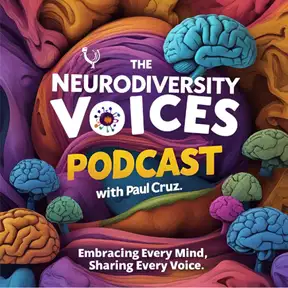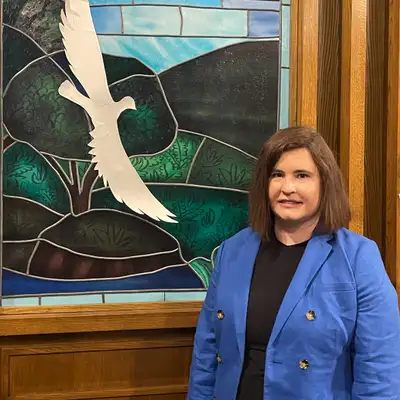Poetry, Neurodivergence, and Resilience with Samantha Merz
Download MP3Hello, I'm your host Paul Cruz, and welcome to the Neurodiversity Voices podcast, where we celebrate and amplify the unique perspectives and experiences of neurodiverse individuals. I'm thrilled to have you join us on this journey of exploration, advocacy, and celebration of neurodiversity. Together, we'll have meaningful conversations, share inspiring stories, and challenge misconceptions about neurodiversity. This podcast is for everyone, whether you're neurodivergent yourself, an educator, a parent, or just someone curious to learn more. Our goal is to amplify voices, foster understanding, and spark change in the way we view and support neurodiversity.
Paul Cruz:We're so excited to have you with us as we celebrate the beauty of diverse minds and work toward a more inclusive future. So sit sit back, relax, and let's get started. Welcome to the Neurodiversity Voices podcast. Today, we have Samantha Mers on our show. Welcome to the show, Samantha.
Samantha Merz:Thank you for having me, Paul. Great to be here.
Paul Cruz:Can you share your journey of discovering poetry and how it became a powerful outlet for your emotions and experiences?
Samantha Merz:Yes. So I discovered poetry when I was 19 years old. I just found it easier to express myself through written words rather than articulating my thoughts in speech. So I wrote my first poem and draft, and submitted it for consideration to a poetry contest, and it was accepted. So that was my first published poem.
Samantha Merz:So that was a really great feeling and it inspired me to keep on writing.
Paul Cruz:How has your neurodivergence shaped your creative process and the themes you explore in your poetry?
Samantha Merz:Yes, so my neurodivergence has kind of contributed in my way of thinking a bit literally. So I try to take those concepts and make it a bit more abstract. And I find that, like, experiencing loneliness is really prominent with my neurodivergence. So that is one of the themes in my poems.
Paul Cruz:Your poetry collections, Kazu and Medolite delve into themes like resilience and self discovery. What inspired these works and how do they reflect your personal journey?
Samantha Merz:Yes. So Kazoo was kind of my first collection of poems and they were all through previously published works, So they kind of relate long themes of loneliness and having a bad day and putting that into words. And Meadow Light is kind of was in, like, 2023 it came out. So it's kinda like the pandemic thoughts and feelings and I put them into words and they were also previously published, so it's kind of a two collections of poems.
Paul Cruz:What challenges have you faced as a neurodivergent individual in the creative world and how have you overcome them?
Samantha Merz:Challenges I've faced is really trying to promote and sell my work and balancing that with a job and trying to put my creative endeavors or outlet, giving that a bit more grace when I'm at home and I have some downtime and using like the weekends to really promote my work and then focusing on my other work throughout the week.
Paul Cruz:And how has connecting with the online poetry community impacted your growth as a writer and as a person?
Samantha Merz:Yes, I find the online poetry groups really helpful, particularly when I was on Twitter before my account was hacked, I found that like fevers of the mind was really helpful with promoting and sharing my work. And then I'm also part of the writers group through Facebook and they are possibly going to publish a collection of works from all the writers. So that would be amazing to see.
Paul Cruz:Mental health advocacy is a big part of your work, right? What steps do you think society can take to better support neurodivergent individuals?
Samantha Merz:I think the most important aspect to support neurodivergent individuals is acceptance and patience and coming to an understanding that not everyone has the same way of thinking and carrying out their ideas and their thoughts and even how they like their executive functioning could be different. So I think that's the main thing.
Paul Cruz:And can you talk about the role of community support groups like Thrive Open Door and Coast Mental Health in your life?
Samantha Merz:Yes. So a Thrive Open Door group has been very important to me. I've been a part of it for two years and it has lots of leisure activities that you can pursue, about two per term, and that's over like a two month period. And then Coast Mental Health Clubhouse is really great. I'm a part of the young adult program.
Samantha Merz:So they have community kitchen, little social outings, and they have, programs like brain training and other activities throughout the day, and it varies on a month to month basis, so both are really important for me.
Paul Cruz:How do activities like singing in a choir and playing badminton contribute to your mental well-being and creativity?
Samantha Merz:Yes, so singing with the Vivaldi Chamber Choir is really helpful. It just keeps me sharp mentally and it's part of the community, which I've been a part of since I was 19 as well, so it's kind of linked to when I began writing poetry and just the music really wants to bring me to explore my creative pursuits and really express my emotions more. And whereas with badminton, I feel like it's a rush of energy whenever I play, which is usually once a month. I used to play about once a week, but, I kinda aged out when I turned 30. So whenever I do play it, I really enjoy it.
Samantha Merz:And there's a little group of adults that are kind of the same that turn up. So it's great to kind of build on social networking as well.
Paul Cruz:And what advice would you give to neurodivergent individuals who are hesitant to share their creative work or personal stories?
Samantha Merz:I feel that you don't have to share your work, but I think that journaling and writing down your thoughts are really important to do, especially if you're going through a hard time. I think just putting things in perspective really helps.
Paul Cruz:And how do you balance your work as an administrative assistant? Previously, in Geriatric Medicine in your creative pursuits and advocacy efforts?
Samantha Merz:Yes. I balance my work by usually using the weekends and time off work to pursue going to Thrive or post mental health and playing badminton, singing and writing poetry, and then once I get back to work, that's kind of the main focus, so I just kind of lead two separate lives almost.
Paul Cruz:What message do you hope to convey through your blog and Instagram platform? And how do you envision inspiring others?
Samantha Merz:I guess my message on my website is just listing all the things I've accomplished and done and my experience and hoping that it resonates with other readers and to pursue their dreams and meet their goals. And with my poetry, encouraging more neurodivergent voices to be heard and really wanting to convey that if you're going through a hard time, you can put it into writing and it'll resonate deeper with you and maybe you can find a deeper meaning within it.
Paul Cruz:Looking ahead, what are your goals for your poetry and advocacy work and how do you plan to continue raising awareness about neurodiversity?
Samantha Merz:Well, I plan on doing a podcast with Coast Mental Health in the young adult program through the Rebel Rousers program so that I think maybe I'll share some more poetry through there because I shared it with their zine they had. And then with my own poetry and mental health awareness, probably doing more podcasts and maybe writing more experiences that happened to me that I haven't written about yet and really kind of do an overlap of mental health and poetry.
Paul Cruz:What inspired you to write your latest book, 'Only You Will Do' and how does it differ from your previous works?
Samantha Merz:Yes. So I was inspired to write 'Only You Will Do', my third book, based on a difficult experience I had in 2023. And, it's kind of a lighter read than the other two books. It's kind of with drafts I had in my computer for a while, and I just thought it was the right time to put them out. And one poem I'd like to read out, it has to do with Thrive.
Samantha Merz:Here it is, Thrive. Tough times faced by members, honing in on their skills, realistic goals set by members, interesting classes being taught, very dedicated staff, efforts made by all participants.
Paul Cruz:Nice. And how do you approach writing poetry? Do you follow a specific routine or let inspiration guide you?
Samantha Merz:I usually let inspiration guide me. My muse is a bit fickle. It only comes to me when bad things happen to me. So, trying to have to give myself time and write down my thoughts and feelings whenever that happens.
Paul Cruz:And can you describe the role imagery plays in your poetry and how you use it to convey emotions?
Samantha Merz:Yes. So imagery is a big thing in my poetry from using like mermaids to using leprechauns and kind of fictitious characters, and they just represent something bigger that I'm dealing with in my mind. And so I want to kind of make it a bit more lighthearted and fun to readers.
Paul Cruz:Do you balance vulnerability and creativity in your work?
Samantha Merz:I balance vulnerability with creativity. Sometimes I have to edit out quite a bit of wording I've used to make it like more vague and more digestible to readers and my creativity with vulnerability. I just kind of use color almost as a guide, So that really helps.
Paul Cruz:Wrap things up. What advice would you give to aspiring poets who are exploring themes of mental health and self discovery?
Samantha Merz:Yeah. My advice would be to start writing down as much as you can, and then you can always go back and edit your work and fine tune it. And then if you're comfortable, you can share it with a larger body, like through kind of traditional self publishing or through online. You can submit through a website called Subbittable, and there's lots of options to share your work with other readers.
Paul Cruz:And Samantha, where can our listeners find you?
Samantha Merz:They can reach out to me on my website, samanthamirs.wordpress.com, and my books are available on blurbbookstore.com.
Paul Cruz:Are you also on social media?
Samantha Merz:Yes, I'm on Instagram samanthamirs, Facebook samanthamirs. That's about it.
Paul Cruz:Okay, we'll provide them in the show notes. That's all for today's episode of the neurodiversity voices podcast. Thank you so much for tuning in and being part of this important conversation. We hope you found today's discussion insightful and inspiring. Remember, every voice matters and together we can create a more inclusive and understanding world for neurodivergent individuals.
Paul Cruz:If you enjoyed this episode, please leave us a rating or a review on your favorite you have any questions, ideas, or stories you'd like to share, please feel free to fill out our listener feedback and survey form or even apply to be our guest speaker on our website at www.neurodiversityvoices.com. We'd love to hear from you. Until next time, take care, stay curious, and keep celebrating the beauty of diverse minds. Thanks for listening to the Neurodiversity Voices podcast.
Creators and Guests


